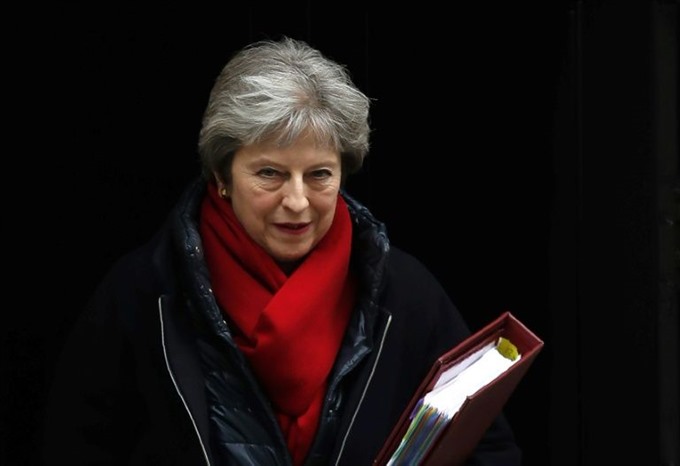 World
World

British Prime Minister Theresa May will detail plans today for a new economic relationship with the EU after Brexit, amid heightened tensions with Brussels over the implications for Northern Ireland.
 |
| Britain’s Prime Minister Theresa May will make a major speech on Brexit today. — AFP/VNA Photo |
LONDON — British Prime Minister Theresa May will detail plans today for a new economic relationship with the EU after Brexit, amid heightened tensions with Brussels over the implications for Northern Ireland.
In a major speech, just weeks before trade talks with the European Union are due to begin, May will argue Britain must forge its own path free from the bloc’s current rules.
But she will call for the "broadest and deepest possible agreement, covering more sectors and co-operating more fully than any free trade agreement" that exists, according to extracts issued by her office Thursday.
She will say this is "achievable" and in the interests of the EU and Britain because of how closely they are currently aligned.
"Rather than having to bring two different systems closer together, the task will be to manage the relationship once we are two separate legal systems," May is set to say.
EU leaders have been pressing the prime minister to clarify what she wants before they agree their position on the future economic partnership at a summit later this month.
Brussels raised the pressure this week with a draft treaty suggesting Northern Ireland could stay in a customs union with the EU while the rest of Britain remained outside.
The proposal was offered as a fall-back option if London failed to come up with a better solution to avoid new customs checks between British-ruled
Northern Ireland and EU member Ireland, where some fear a "hard border" could upset the fragile peace.
But it prompted outrage in Westminster, where May warned it threatened the integrity of her country and was something that "no UK prime minister could ever agree to".
In her speech today, May will stress that any Brexit deal "must strengthen our union of nations"
’No frictionless trade’
May says Britain will leave the EU’s single market and customs union after Brexit, in a bid to end mass migration and ensure it no longer has to follow the bloc’s rules.
She will emphasise Friday that the 2016 referendum vote to leave the EU "was a vote to take control of our borders, laws and money".
But EU leaders warned Britain cannot expect to sever formal ties with its closest trading partner and still reap the same benefits.
EU President Donald Tusk repeated this on Thursday, when he also visited May in Downing Street, saying: "There can be no frictionless trade outside of the customs union and the single market."
British eurosceptics warn that staying within those institutions is akin to not leaving the EU at all.
Foreign Secretary Boris Johnson suggested this week that the row over Northern Ireland’s status was a political ploy to force the government into changing course.
Jacob Rees-Mogg, a leading eurosceptic lawmaker in May’s Conservative party, said that there were "technological solutions" to avoiding a hard Irish border.
He said that for Britain to stay in a customs union, forced to follow EU rules while losing its seat at the table as an EU member, would be "fatal for Brexit".
However, the main opposition Labour party on Monday came out in favour of the idea, which is already backed by the main business lobby groups.
Their change in stance raises the stakes in parliament, which will vote on the final exit deal and where May has only a slim majority.
Former prime ministers John Major and Tony Blair this week publicly criticised the government’s hopes of continued frictionless trade outside EU institutions.
"It’s not a question of a tough negotiation or a weak negotiation, it literally is not going to happen," Blair told BBC radio. — AFP